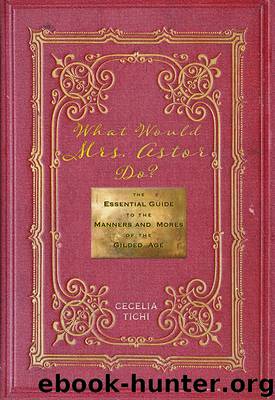What Would Mrs. Astor Do? by Cecelia Tichi

Author:Cecelia Tichi
Language: eng
Format: epub
Tags: HIS000000 History / General
Publisher: NYU Press
Figure 38. “The Golden Horse-shoe at its Best”
Stage-Door Johnny
The 1905 divorce of Mr. and Mrs. Edwin Main Post of New York City was hardly newsworthy. More momentous events of the year included the launch of President Theodore Roosevelt’s first full term in office and the record-breaking flight of Wilbur Wright’s Wright Flyer III, which exceeded thirty minutes in the air. Even the end of the thirteen-year marriage of a rather prominent New York couple failed to qualify for “Page One” of the New York Herald or Tribune. Only later would Mrs. Post, the divorcée, become famous as the author of Etiquette, a go-to bible for unimpeachable cradle-to-grave manners. But if her fame lay ahead, Mrs. Post’s split was nonetheless instructive for the light it shone on the demimonde of Gilded Age New York, for Emily Price Post had initiated divorce proceedings upon learning of her husband’s chronic affairs with chorus girls and young actresses. His infidelities marked him as a “stage-door Johnny.”
Such a man hovered at the theater stage door to attract the attention of a young actress or chorine as she exited after the show. He cut a fine figure in a silk high hat with a yellow chrysanthemum boutonniere, a walking stick in one hand and a bouquet in another. “He met his chorus girl as she stepped over the threshold, presented his bouquet, and whisked her away in a hansom cab.” Perhaps he greeted his “lady of the chorus” with a diamond brooch or tucked a necklace of the gems in her bouquet as a sweet surprise. Low-paid dancers and bit-part actresses were easy pickings, barely scraping by in run-down boarding houses, subsisting on meager diets. The novelist and journalist Theodore Dreiser spotlighted such a young woman in his 1900 novel Sister Carrie, as the chorus girl Carrie Meeber struggles on the lower rungs of the show-business ladder, where a manager “judged women as another would horseflesh.” (A famous twentieth-century Thoroughbred race horse was named Stage Door Johnny.) As her star rises, a young male escort takes her to dinner at Delmonico’s, while “gentlemen with fortunes” send “mash” notes professing their adulation and longing for her company. Flocks of such single “girls” clustered in New York from the late 1800s, some from immigrants’ families, some lured to the city from America’s farms and hamlets.
The man’s wee-hours after-theater entertainment would cost him, at minimum, a champagne supper for two at a lobster palace or steakhouse or a restaurant featuring duck à l’orange. In Peacocks on Parade, Albert Stevens Crockett describes how the pair might go for a “spin” through Central Park in order to time her entrance at dinner: “She waited until the after-theater supper crowd had gathered, and then, on the arm of her gallant, paraded across the dance floor. The orchestra leader, if he played his part well, was watching for her, and she was greeted by the strains of the hit song from her show. She pretended to be a bit flustered by the attention. .
Download
This site does not store any files on its server. We only index and link to content provided by other sites. Please contact the content providers to delete copyright contents if any and email us, we'll remove relevant links or contents immediately.
| Civilization & Culture | Expeditions & Discoveries |
| Jewish | Maritime History & Piracy |
| Religious | Slavery & Emancipation |
| Women in History |
Cecilia; Or, Memoirs of an Heiress — Volume 1 by Fanny Burney(32533)
Cecilia; Or, Memoirs of an Heiress — Volume 2 by Fanny Burney(31931)
Cecilia; Or, Memoirs of an Heiress — Volume 3 by Fanny Burney(31922)
The Secret History by Donna Tartt(19010)
Sapiens: A Brief History of Humankind by Yuval Noah Harari(14350)
Leonardo da Vinci by Walter Isaacson(13299)
The Radium Girls by Kate Moore(12007)
Sapiens by Yuval Noah Harari(5353)
How Democracies Die by Steven Levitsky & Daniel Ziblatt(5207)
The Wind in My Hair by Masih Alinejad(5082)
Homo Deus: A Brief History of Tomorrow by Yuval Noah Harari(4893)
Endurance: Shackleton's Incredible Voyage by Alfred Lansing(4747)
Man's Search for Meaning by Viktor Frankl(4561)
The Silk Roads by Peter Frankopan(4520)
Millionaire: The Philanderer, Gambler, and Duelist Who Invented Modern Finance by Janet Gleeson(4455)
The Rape of Nanking by Iris Chang(4193)
Joan of Arc by Mary Gordon(4085)
The Motorcycle Diaries by Ernesto Che Guevara(4078)
Stalin by Stephen Kotkin(3949)
